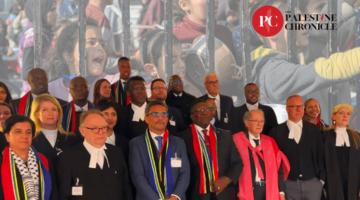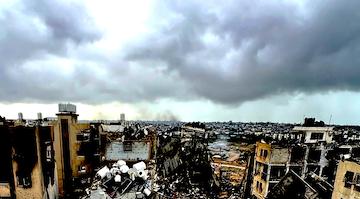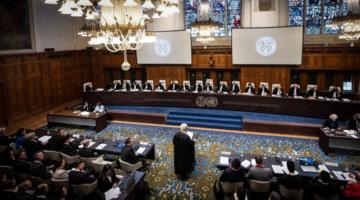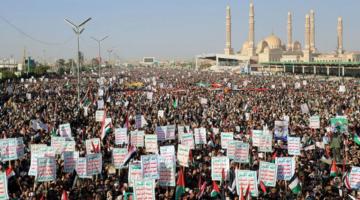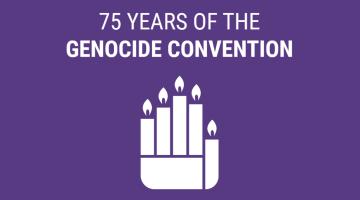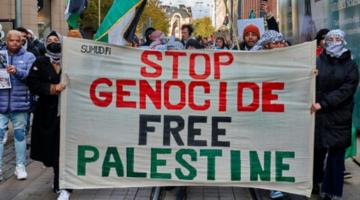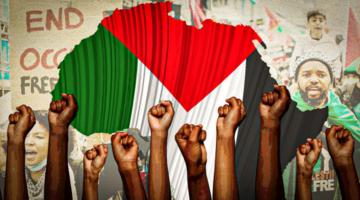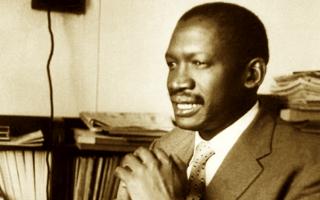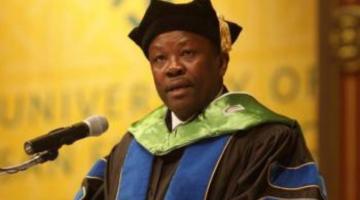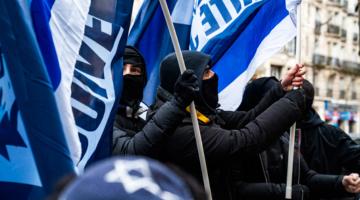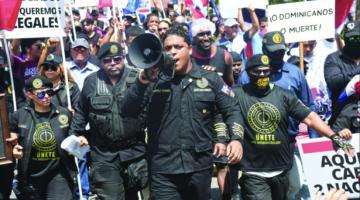Hector Pieterson was killed by police in Soweto on June 16, 1976. (Photo: Sam Nzima/Gamma-Keystone via Getty Images)
Worldwide outrage over the killing of Soweto youth protesting on June 16, 1976 was a turning point in South African history. But the end of apartheid was not the end of racist oppression or corporate domination. What should have been a revolution was betrayed by corruption and the cynical politics of representation.
When Hector Pieterson and many other children took to Soweto’s streets on June 16, 1976, they rose in the midst of racial oppression, grinding poverty and exploitation of an apartheid system that was more than anyone should tolerate. But a mandate for school children to learn in the Afrikaans language – the language of settler white oppressors – was beyond humiliating. It was degrading, and it needed to be fought.
Pieterson’s only conscious objective may have been to protest a language rule for schools, but on a more fundamental, subconscious level his cry was likely for total liberation from the chains of apartheid. It was a demand that his people be allowed to exercise the most basic human right of self-determination.
The 12-year-old was one of the first of hundreds to be shot by South African police that day, and the photo of his lifeless body being carried from the scene became not only iconic, but fuel for a raging global fire that reduced to cinders much of the reactionary defense of a discredited racist system.
In the years that followed, the apartheid regime became an international pariah subjected to diplomatic condemnation and economic and cultural isolation. Within the country, Africans not only fought, but also heeded calls to make South Africa ungovernable. The regime made various desperate efforts to preserve as much of the social and political aspects of apartheid as possible. But in the end, Nelson Mandela emerged from prison cast as a larger-than-life messianic figure, polling places were opened to African voters, and South Africa’s political structures housed a new multi-hued government. Was it the fulfillment of Hector Pieterson’s mission? It was not.
Social and political reform standing alone cannot ensure self-determination. In the absence of control of a national economy the broad masses of people remain subject to the will and domination of capitalist bosses. Multi-national corporate executives not only understood this but counted on a global craving for change in South Africa – any change – that would mask continuing foreign corporate domination of the country’s economy and seemingly limitless valuable resources.
In 1965, Kwame Nkrumah analyzed a South African economy that was essentially the same as that which existed when Soweto’s children took to the streets a bit more than a decade later. He noted:
“It has been estimated that over 50 percent of the foreign capital invested in Africa has been poured into South Africa … A 1957 U.S. government survey of American overseas investments shows the single most profitable area was in the mining and smelting business of South Africa, whose profits are higher than from any comparable investment in the United States.”
Nkrumah went on to explain that the high profits were the product of exploitation of cheap South African labor. It was so cheap that U.S. miners were, on average paid 27 times more than miners in South Africa. One would think that with the end of apartheid would come the elimination of such a radical disparity in pay. However, in a presumably post-apartheid South Africa, not only were the pleas of miners disregarded, but miners also became targets of a government attack that was in some ways comparable to the Soweto massacre.
On August 16, 2012, South African police, essentially functioning as thugs for the Lonmin Platinum Mines, opened fire on a crowd of miners in the town of Marikana as they staged a wildcat strike in protest of low wages. Nearly 80 miners were wounded, and more than 30 were killed by assault rifles. The massacre triggered similar strikes at mines throughout South Africa.
If the response of a government to demands for higher wages is mass murder, then the idea of people’s ownership and control of the mines is unthinkable. Perhaps this was part of Nelson Mandela’s calculation as he negotiated a new South African reality that transformed interracial social relationships and access to government but left untouched the country’s economic paradigm. Regardless of whether Mandela was motivated by a desire to prevent bloodshed, the shifting of the trajectory of the people’s drive for liberation away from seizure of South Africa’s wealth, resources and means of production has served the country badly. Soweto is a case in point.
During his lifetime, Hector Pieterson’s Soweto was a sprawling slum under attack by not only apartheid’s violence, but also extreme poverty. Writer Niq Mhlongo, who was raised there said:
“My mother tells me the house where I was born in the Chiawelo section of Soweto in 1973 didn’t have windows, doors or a paved floor when they moved in. My father earned very little as a cleaner at the post office and had no money to fix it. So my mother and her friends would go to a nearby farm to steal cow dung to make the floor. One day she got bitten by the farmer’s dog. That scar of poverty is still engraved on her hand like an ugly tattoo.”
However, in so-called post-apartheid South Africa, Soweto has undergone gentrified transformation. Mhlongo explains:
“This new Soweto is a place where the designer-clad patrons of the area’s many bars arrive in fancy cars and drink Moet & Chandon champagne while chatting on their smartphones. It is fast catching up with Cape Town’s Long Street, Durban’s Florida Road or Johannesburg’s own Braamfontein or Maboneng as the preferred buzz location for tourists and locals with money. Before the fall of apartheid in 1994 no one seemed to care that this corner of Johannesburg was the only street in the world where two Nobel prize winners once lived – former president Nelson Mandela and Archbishop Desmond Tutu. (Pan Africanist Congress president “Uncle” Zeph Mothopeng and ANC stalwart Tata Walter Sisulu lived nearby.) Today Mandela’s old house is a national museum and the stretch of concrete outside is filled with overpriced vendor stalls. Most of the Airbnbs and restaurants selling expensive beer were residential homes in the 1990s.”
Nevertheless, for Black residents who are not part of the privileged gentry, Mhlongo said there is another Soweto.
“The other Soweto is revealed when you climb the 49 steps of Oppenheimer Tower to get a panoramic view of the whole district – separated from downtown by a string of old gold mine dumps that young people often mistake for mountains. It is home to 1.3 million people, a quarter of the city of Johannesburg. This other Soweto is modern and sophisticated in places, but also blighted by poverty, unemployment, drug addiction and crime. Poverty can be seen in the dirty rusted roofs of the Kliptown squatter camp to the south-east and the Jabulani hostel below, built as dormitory accommodation for migrant black workers in the 1950s. Down the street you might see police chasing a stolen car, or a crowd that has gathered around a victim of mob justice. Addicts of the notorious cheap drug nyaope – a cocktail of low-grade heroin, cannabis and sometimes anti-retroviral drugs or rat poison – are everywhere: in parks, at the traffic lights, outside shops.”
The current plight of Soweto’s poor is a lesson not only about South Africa’s unfinished revolution, but also about the interconnection of the South African struggle and struggles waged throughout Africa and its diaspora. Gentrification and poverty are as well known to Africans born and living in Detroit as they are to the people of Soweto. Not only that, but international banking and multinational corporate activities that create these conditions in many cities around the world are driven by the same capitalist engine. The task is to throw a monkey wrench into that engine wherever and however it is most convenient and effective.
In honor of the sacrifice and legacy of Hector Pieterson we are compelled to permanently disrupt and destroy multinational corporate dominance. In Africa, the U.S., acting through U.S. Africa Command (AFRICOM) and on behalf of imperialism is positioning itself to use force to put down any such efforts. The Black Alliance for Peace is fighting back with its U.S. Out of Africa campaign. But Africa need not be the only field of battle. Even if the fatal blow against corporate hegemony is struck outside of South Africa, our success will be felt there because a destabilized international capitalist system will clear the way for people of that country to at long last seize the national wealth, resources and means of production that have been denied them for far too long.
Mark P. Fancher is an attorney and writer. He is a member of the Black Alliance for Peace Africa Team and the All-African People’s Revolutionary Party. The views expressed are his own and do not necessarily reflect the views of organizations with which he is affiliated. He can be contacted at mfancher[at]comcast.net.


